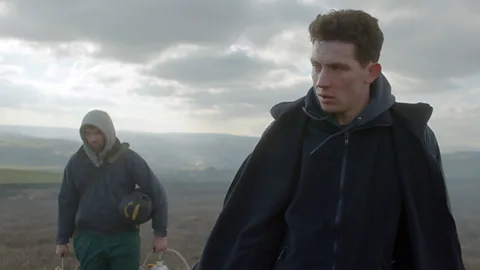God’s Own Country is Britain’s answer to Brokeback Mountain
 Dales Productions Limited/The British Film Institute
Dales Productions Limited/The British Film InstituteFrom the Berlin Film Festival, this outstanding debut film is a ‘thrillingly real story of gay love’, writes Jessica Kiang.
Under battered Yorkshire skies, with grime beneath its nails and soil clodding up the treads of its boots, Francis Lee's outstanding feature debut God's Own Country is a work of rough-hewn alchemy. But instead of gold, from the muck and straw it spins a thrillingly real story of gay love. It will inevitably invite comparisons with Ang Lee's Brokeback Mountain — at times it almost actively courts them — but seldom has a film or its characters felt less derivative.
In any case, this isn't only a love story. It is also an immigrant tale and an unflinching portrait of rural farm life where the war between tradition and change is bitter and has real casualties. And in Josh O'Connor (Peaky Blinders) the film finds a central performance of such authenticity and naturalism that is feels like it grew there, planted some years ago, with a root system that extends for miles under these forbiddingly lovely moors.
This sense of place, and of tactile immediacy in the detail and dirt of its wild location, at times recalls Andrea Arnold's viscerally damp and windswept take on Wuthering Heights, but there is nothing ethereal about Lee's vision of rural life. Instead he finds beauty in details of skin, fur, ordure, spit, vomit, semen, mucus and afterbirth. Here the ‘miracle of birth’ and the ‘circle of life’ are captured in shots of chickens pecking at eggshells, ewes licking the mucus from their newborns, or, during one exceptional sequence, a dead lamb being briskly skinned and its hide used to clothe a runt, so that it will be accepted by the bereaved mother.
In fact the first animal birth that happens here is an abortive one: Johnny (O'Connor) is away bringing a cow to market, and having an anonymous, illicit sexual encounter with a young man he meets there, while back on the farm the pregnant cow to whom he had been tending, dies in the process of giving birth to a half-dead calf. His father Martin (Ian Hart) whose failing health necessitates the use of two walking sticks, unambiguously blames his son and leaves the mercy killing of the calf to him.
‘Animalistically sexual’
Surly, scowling Johnny lives on the inexorably failing livestock farm with his father and grandmother (a terrific Gemma Jones) in an atmophere of mutual hostility and barked-out orders reluctantly followed. Martin, all but incapacitated, hires a Romanian migrant worker to help out for a week during lambing season and when Gheorghe (Alec Secareanu) arrives, it seems at first like he will be just another reason for resentment. Johnny, who gets so blind drunk in the pub most nights that his mornings are spent vomiting, is openly hostile to him, as well as sneeringly dismissive of his old friends from the region who have gone away to college. The only hint we get that there was ever anything more to Johnny than this unprepossessing truculence is at the pub, when an old acquaintance urges him to join her and her college mate for a drink: "He's really funny. You know, like you used to be."
For his part, Gheorghe takes uncomplainingly to the privations of this isolated location, sleeping in a chilly caravan in the courtyard and passing the days working with Johnny mostly in silence. But he is good at the tasks required of him, not just the fence-mending and wall-repairing but the real business of lambing. And during a few days spent away from the farmhouse, in the hills looking after the sheep, living on off-brand pot noodles and sleeping next to each other in a ramshackle outbuilding, Johnny and Gheorghe's relationship becomes first animalistically sexual (their first roll in the hay is notable for the lack of hay: they rut in the dirt) and then, astonishingly to Johnny, loving. Under the influence of sudden happiness, manifested in night-time trysts and secret smiles (though perhaps not so secret to Nan's sharp eyes) Johnny's imperceptible ugly duckling transformation is a quiet joy to behold.
In the past, when faced with ‘gay films’ of the calibre of Moonlight, Carol, the upcoming Sundance wonder Call Me By Your Name or, now, God’s Own Country – films that tell their stories with tenderness and insight and without a scintilla of camp – the tendency in reviewing has been to somehow claim them ‘for everyone who has ever loved’ or ‘for cinema’, in such a way that defines ‘cinema’ as a broadly heterosexual endeavour, and denies their essential queerness. There is a place for that project – there is sociological importance, not to mention a financial imperative, in presenting gay stories in a way that universalises that experience for a wider (read: predominantly heterosexual) audience. But it can't help but feel like maybe the time for that fastidiousness is past. Maybe it's time to let gay love stories be gay love stories, to apologise for their themes as little as God’s Own Country does.
Unlike so many films in this category, this is not about coming out, at least not in the traditional sense — Johnny’s sexuality is a pre-established fact, however unspoken it may be in that household. If anything, it portrays a painfully, magnificently real character coming out as worthy of love, like it's a gift he didn't know he wanted and could never have believed he deserved. It’s not despite Johnny’s gayness, but because of it that the journey is so captivating.
★★★★★
And if you liked this story, sign up for the weekly bbc.com features newsletter, called “If You Only Read 6 Things This Week”. A handpicked selection of stories from BBC Future, Earth, Culture, Capital, Travel and Autos, delivered to your inbox every Friday.
